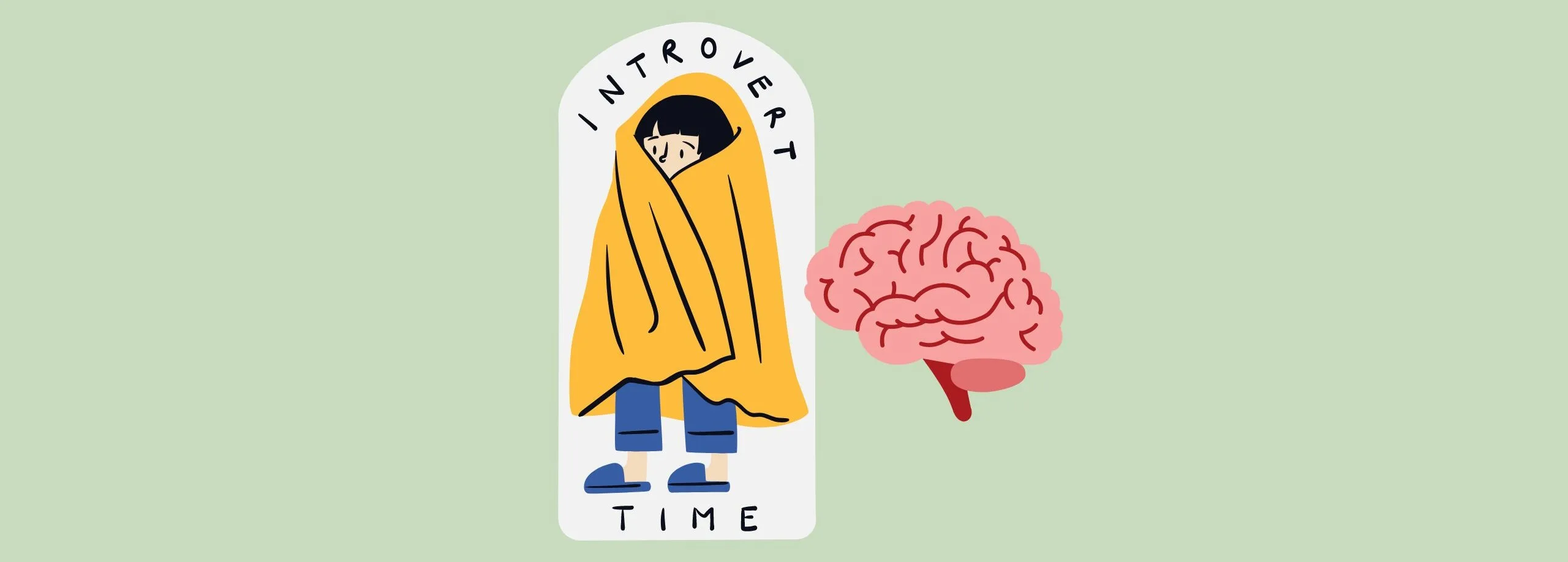 Are you someone who values alone time to recharge your batteries? Do you often prefer deep connections over superficial ones? If this sounds like you, you may be an introvert. However, what if you also struggle with attention and impulsivity? You may suffer from introvert ADHD.
Are you someone who values alone time to recharge your batteries? Do you often prefer deep connections over superficial ones? If this sounds like you, you may be an introvert. However, what if you also struggle with attention and impulsivity? You may suffer from introvert ADHD.
In this article, we will explore the unique challenges that people wth introvert ADHD, as well as some practical coping mechanisms to help manage symptoms. We’ll also delve into the fascinating world of introversion, discussing what it is, how it develops, and its many traits.
Whether you consider yourself an introvert, an extrovert, or somewhere in between, we invite you to join us as we take a deep dive into the intersection of introversion and ADHD. So, let’s explore this captivating topic together.
Introversion: Happily Reserved
What is Introversion?
Introversion is a personality trait characterized by a focus on internal thoughts and feelings in their own head rather than external stimuli and stimulation. Introverts often feel more energized and comfortable in quiet, low-key environments, and may require alone time to recharge their batteries, as compared to a social butterfly. Introversion is not the same as being shy or having social anxiety, although introverts may be more likely to experience these conditions.
How Does Introversion Develop?
Combination of Genetic and Environmental Factors
The environment and genetic composition of a person are thought to play a role in the development of introversion. According to studies, genetic factors account for around 40-50% of the variation in introversion, indicating that it is moderately heritable. Environmental factors, such as upbringing and life experiences, have also been linked to the development of introversion.
Heritability of Introversion
Introversion is moderately heritable, with genetic variables accounting for up to 50% of the risk. The particular genes implicated in introversion are yet unknown, but research suggests that numerous genes are involved, each of which contributes a modest percentage to a person’s risk of being introverted.
Environmental Risk Factors
Environmental factors, in addition to genetics, can contribute to the development of introversion. Life experiences, such as childhood trauma, may contribute to the development of introversion. Cultural attitudes towards introversion may also play a role in shaping an individual’s personality.
Introversion Traits
- Focus on internal thoughts and feelings: An introvert tends to spend a lot of time reflecting
 on their own thoughts and emotions. They may be introspective and self-aware, which can lead to a greater understanding of their own values, beliefs, and motivations.
on their own thoughts and emotions. They may be introspective and self-aware, which can lead to a greater understanding of their own values, beliefs, and motivations. - Reflection and introspection: Introverts often take time to think deeply about the world around them. They may be more likely to analyze information and consider multiple perspectives before making a decision.
- Thoughtfulness and consideration of ideas: Introverts may be more likely to carefully consider their own thoughts and ideas, as well as those of others. They may be more analytical and critical in their thinking and may enjoy discussing complex or abstract topics.
- Need for alone time to recharge energy: Introverts may become drained from too much social interaction or stimulation. They may need to spend time alone to recharge their energy and feel refreshed.
- Enjoyment of socializing, but preference for one-on-one or small group interactions over large, noisy crowds: Despite their preference for quiet environments, introverts may still enjoy socializing with others. However, they may prefer smaller groups or one-on-one social settings, compared to large social gatherings, where they can have more meaningful conversations and build deeper connections. Some introverts are very talkative, but like to save their thoughts for when there are signs of a meaningful relationship.
These traits can affect how introverts interact with the world around them. For example, introverts may be more likely to listen to and observe others before speaking up themselves. They may also prefer to express themselves through writing or other forms of creative expression rather than verbal communication. Overall, introverts tend to value deep connections and meaningful interactions over superficial ones with strangers.
Coping with Introversion
Coping with introversion can be a challenge, but it is an important step in achieving a fulfilling life. Accepting and understanding one’s personality traits is the first step in this process.
Introverts may find it helpful to set boundaries and make time for alone time where they can recharge and reflect. It’s also important to find ways to engage in social situations that are comfortable and enjoyable. This may involve seeking out quieter environments or one-on-one interactions rather than crowded parties or large groups.
Additionally, introverts may find it helpful to express themselves through writing or other forms of creative expression rather than verbal communication. By finding ways to adapt to social situations that may be challenging, introverts can enhance their quality of life and build meaningful connections with others.
ADHD: The Basics
What is ADHD
Attention Deficit Hyperactivity Disorder, commonly referred to as ADHD, is a neurodevelopmental illness that disrupts the brain’s capacity to control attention, behaviour, and emotions. It is a complicated condition that can appear in a variety of ways, but the three major symptoms are inattention, hyperactivity, and impulsivity.
ADHD is a widespread disease that affects 5-10% of children and 2.5% of adults globally. It can have serious consequences in daily life, such as difficulty in academic, social, and occupational situations. Individuals with ADHD, with the correct diagnosis and treatment, can thrive and have full lives.
How Does ADHD Develop?
Combination of Genetic and Environmental Factors
The environment and genetic composition of a person are thought to play a role in the development of ADHD. According to studies, genetic factors account for around 70-80% of the variation in ADHD, indicating that it is highly heritable. Environmental factors, such as mother stress during pregnancy and prenatal toxicity exposure, have also been linked to an increased incidence of ADHD.
Heritability of ADHD
ADHD is highly heritable, with genetic variables accounting for up to 80% of the risk. The particular genes implicated in ADHD are yet unknown, but research suggests that numerous genes are involved, each of which contributes a modest percentage to a child’s risk of getting ADHD. These genes could affect processes in the brain that cause certain ADHD symptoms.
Environmental Risk Factors
Environmental factors, in addition to genetics, can contribute to the development of ADHD. Toxin exposure during pregnancy, such as lead, tobacco, and alcohol, has been related to an increased risk of ADHD. Stress in the mother during pregnancy has also been linked to an increased incidence of ADHD in offspring. Premature birth and low birth weight have also been identified as potential risk factors for ADHD.
ADHD symptoms
 ADHD symptoms are divided into three categories: inattentive, hyperactive-impulsive, and mixed. Inattentive ADHD is distinguished by issues with attention and focus, which frequently result in forgetfulness and disorganization. Hyperactive-impulsive ADHD is distinguished by impulsivity and hyperactivity, which makes it difficult to sit quietly and engage in impulsive behaviours. Combined ADHD is characterised by a combination of inattentive and hyperactive-impulsive symptoms.
ADHD symptoms are divided into three categories: inattentive, hyperactive-impulsive, and mixed. Inattentive ADHD is distinguished by issues with attention and focus, which frequently result in forgetfulness and disorganization. Hyperactive-impulsive ADHD is distinguished by impulsivity and hyperactivity, which makes it difficult to sit quietly and engage in impulsive behaviours. Combined ADHD is characterised by a combination of inattentive and hyperactive-impulsive symptoms.
Each subtype of ADHD manifests differently and presents its own set of obstacles. Individuals with inattentive ADHD, for example, may struggle with task completion and following through on their tasks and commitments (being “inattentive”), whereas those with hyperactive-impulsive ADHD may struggle with impulse control and engaging in risky behaviours among other children.
It is critical to understand that ADHD is a complex condition that manifests differently in each individual. A correct diagnosis and knowledge of the individual’s symptoms are required for effective ADHD therapy and management.
Diagnosis of ADHD
ADHD diagnosis can be a difficult and time-consuming process. A healthcare provider will usually start with a thorough medical and psychological evaluation, which will include inquiries about the individual’s symptoms, medical history, and family history of ADHD. They may also provide cognitive and behavioural tests, such as IQ tests and attention tests, to evaluate the individual’s cognitive and executive functioning skills, as well as attention abilities.
To be diagnosed with ADHD, a person must match precise diagnostic criteria defined in the American Psychiatric Association’s Diagnostic and Statistical Manual of Mental Disorders (DSM-5). The DSM-5 identifies three primary criteria for diagnosing ADHD:
- The person must have a chronic pattern of inattention and/or hyperactivity-impulsivity that interferes with daily functioning in at least two separate situations (e.g., home, school, work).
- The symptoms had to have appeared before the age of 12.
- The symptoms must be unrelated to the individual’s developmental level and not entirely due to another medical or psychological issue.
It’s crucial to remember that diagnosing ADHD can be difficult because many of the symptoms overlap with other diseases like anxiety, depression, and bipolar disorder. As a result, a complete evaluation and assessment by a skilled healthcare practitioner is required for a good diagnosis.
How Is ADHD Managed?
Medications
People with ADHD can benefit from a variety of drugs, including stimulants and non-stimulants. The most typically given first line drugs for ADHD are stimulants such as methylphenidate and amphetamines. These drugs can aid with attention, impulsivity, and hyperactivity control. Other ADHD medications include nonstimulant medicines, such as atomoxetine and guanfacine, which can also be beneficial in the treatment of ADHD, especially in people who cannot tolerate stimulants. It’s crucial to remember that medicine isn’t a cure for ADHD, but rather a tool for managing symptoms.
Stimulants can be addictive for some individuals, especially if they are prone to addiction, so they should be used with caution. It is important to work with a healthcare provider and discuss the potential pros and cons of starting stimulant medication, as well as assessing one’s risk. The thought of addiction could also make an individual uncomfortable for a variety of reasons, so that is something to take into account.
Behavioral therapy
Behavioral therapy can be a useful supplement to medication for ADHD management. Therapy can help
people with ADHD develop coping techniques and improve executive functioning skills including planning, organization, and time management. Cognitive-behavioral treatment (CBT), social skills training, and parent training are some examples of ADHD behavioral therapy. Behavioral therapy can be especially beneficial for children with ADHD since it teaches them skills that they can use throughout their lives.
Lifestyle changes
Aside from medication and counseling, people with ADHD might benefit from lifestyle changes. Regular exercise can help lessen ADHD symptoms, increase mood, and improve general well-being. A balanced diet rich in fruits, vegetables, whole grains, and lean protein can also be beneficial. Avoiding meals heavy in sugar, artificial flavors, and preservatives may also aid in symptom relief. Good sleep habits, such as obtaining enough sleep each night and sticking to a regular sleep schedule, can also help with ADHD symptoms management.
Like with a lot of medical conditions, lifestyle is often an overlooked factor. However, by changing one’s daily habits, a large improvement can be seen over time.
ADHD and Introversion: A Different Presentation
Now that we have discussed both introversion and ADHD, we can talk about the characteristics of ADHD introverts. While ADHD introverts might have similar presentations to people experiencing both separately, there are important differences to keep in mind.
How ADHD and Introversion Affect Each Other
ADHD and introversion might seem like an unlikely duo, but the truth is that they can heavily influence one another. ADHD introverts have a unique presentation that is different from most people who have only one of these conditions.
For introverts with ADHD, their internal focus and need for alone time can clash with the impulsivity and hyperactivity that come with ADHD. For example, an ADHD introvert might have difficulty sitting still during a long meeting or struggle with overstimulating environments, even more so than an outgoing, extroverted person with ADHD.
On the other hand, introversion can also be a strength for people with ADHD. Some studies have suggested that introverted people with ADHD may have better working memory and cognitive control than their extroverted peers with ADHD. This could be because introverts are more adept at filtering out distractions and staying focused on a task.
The Link with Social Anxiety
The combination of ADHD and introversion can have a significant impact on an individual’s experience![]() with social anxiety. For example, individuals with ADHD who are introverted may experience heightened levels of anxiety in social situations due to their tendency to focus more on internal thoughts and feelings rather than external stimulation. This can lead to difficulty in socializing and feeling overwhelmed in situations that require them to interact with others.
with social anxiety. For example, individuals with ADHD who are introverted may experience heightened levels of anxiety in social situations due to their tendency to focus more on internal thoughts and feelings rather than external stimulation. This can lead to difficulty in socializing and feeling overwhelmed in situations that require them to interact with others.
In addition, individuals with ADHD may have difficulty with social cues and may struggle to regulate their emotions in social situations, leading to further anxiety. For example, they may miss social cues such as facial expressions or body language, which can lead to misunderstandings and further social anxiety. They may also find it challenging to control their impulses and may say or do things impulsively, leading to embarrassment and anxiety.
Moreover, social anxiety can affect different areas of an individual’s life, such as school, work, and personal relationships. Individuals with ADHD and introversion may struggle to make and maintain friendships, and may have difficulty in romantic relationships due to their social anxiety. They may also struggle in academic or work settings, where socializing is a crucial part of networking and building professional relationships.
It is important to note that social anxiety can manifest differently in each individual, and that it is a complex condition that requires appropriate treatment and management. People with ADHD and introversion who experience social anxiety can benefit from therapy, medication, and lifestyle changes to manage their symptoms and improve their quality of life.
Tips to Cope with ADHD and Introversion
Here are some coping mechanisms for people with ADHD and introversion:
- Schedule alone time: Set aside time in your schedule for alone time to recharge your energy and focus on internal thoughts and feelings. This can involve activities such as reading, meditating, or taking a walk in nature.
- Identify your preferred social environments: Avoid overstimulating environments that can be overwhelming, such as crowded parties or noisy restaurants. Instead, seek out quieter environments or one-on-one interactions that allow for more meaningful conversations and deeper connections.
- Set boundaries: Learn to say no to social situations that are uncomfortable or draining, and prioritize your own needs for alone time and rest.
- Practice mindfulness: Mindfulness techniques such as meditation or deep breathing can help manage symptoms of anxiety and improve focus and emotional regulation.
- Seek support: Reach out to friends, family, or a therapist for emotional support and guidance in managing symptoms of ADHD and introversion.
- Engage in creative expression: Find ways to express yourself creatively, such as through writing, music, or art, as a way to process and communicate your thoughts and feelings.
- Practice healthy habits: Regular exercise, a balanced diet, and good sleep habits can all contribute to overall well-being and help manage symptoms of ADHD and introversion.
Using an App for ADHD Introverts
Attention Deficit Hyperactivity Disorder can be difficult to deal with for patients, especially when combined with introversion. The Careclinic has a dedicated diary section that allows you to write down all the things that you need to complete. Furthermore, other things on the app include a medication section, where you can track all the medications you are taking and get daily reminders for them, and a symptoms section, where you can record all the symptoms you experience. Next time you visit the doctor or therapist, all this information will be handy in your pocket!
In conclusion, introversion and ADHD can present unique challenges when experienced together. However, understanding and accepting one’s personality traits and seeking appropriate treatment can help individuals with introvert ADHD manage their symptoms and improve their quality of life. It’s important to remember that everyone’s experience with introversion and ADHD is different, and there is no one-size-fits-all solution. By practicing self-care, seeking support, and adapting to social situations in ways that are comfortable and enjoyable, introvert ADHD individuals can thrive and build meaningful connections with others.
Sources
- Centers for Disease Control and Prevention. (2021). Attention-deficit/hyperactivity disorder (ADHD). Retrieved from https://www.cdc.gov/ncbddd/adhd/data.html
- Klarity (2023). ADHD Tools For Organization & Time Management https://www.klarityadhd.com/post/adhd-tools/
- MayoClinic (2023). Adult attention-deficit/hyperactivity disorder (ADHD). https://www.mayoclinic.org/diseases-conditions/adult-adhd/symptoms-causes/syc-20350878
- National Institute of Mental Health. (2021). Attention-deficit/hyperactivity disorder. Retrieved from https://www.nimh.nih.gov/health/topics/attention-deficit-hyperactivity-disorder-adhd/index.shtml


